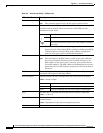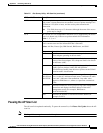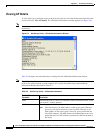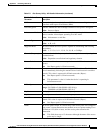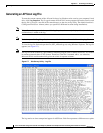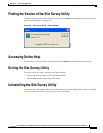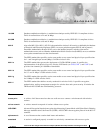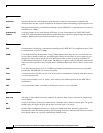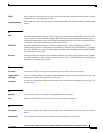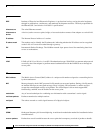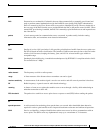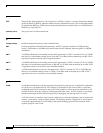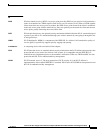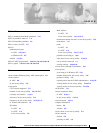
Glossary
GL-2
Cisco Aironet 802.11a/b/g Wireless LAN Client Adapters (CB21AG and PI21AG) Installation and Configuration Guide
OL-4211-03
B
bandwidth
Specifies the amount of the frequency spectrum that is usable for data transfer. It identifies the
maximum data rate that a signal can attain on the medium without encountering significant power loss.
BPSK
Binary phase shift keying. A modulation technique used by IEEE 802.11-compliant wireless LANs for
transmission at 1 Mbps.
broadcast key
rotation
A security feature for use with dynamic WEP keys. If your client adapter uses LEAP, EAP-FAST,
EAP-TLS, or PEAP authentication and you enable this feature, the access point changes the dynamic
broadcast WEP key that it provides at the interval you select.
C
CCK
Complementary code keying. A modulation technique used by IEEE 802.11b-compliant wireless LANs
for transmission at 5.5 and 11 Mbps.
CCKM
Cisco Centralized Key Management. Using CCKM, authenticated client devices can roam from one
access point to another without any perceptible delay during reassociation. An access point on your
network provides wireless domain services (WDS) and creates a cache of security credentials for
CCKM-enabled client devices on the subnet. The WDS access point's cache of credentials dramatically
reduces the time required for reassociation when a CCKM-enabled client device roams to a new access
point.
CKIP
Cisco Key Integrity Protocol. Cisco’s WEP key permutation technique based on an early algorithm
presented by the IEEE 802.11i security task group.
client
A radio device that uses the services of an access point to communicate wirelessly with other devices
on a local area network.
CSMA
Carrier sense multiple access. A wireless LAN media access method specified by the IEEE 802.11
specification.
CRC
Cyclic redundancy check. A method of checking for errors in a received packet.
D
data rates
The range of data transmission rates supported by a device. Data rates are measured in megabits per
second (Mbps).
dBi
A ratio of decibels to an isotropic antenna that is commonly used to measure antenna gain. The greater
the dBi value, the higher the gain and the more acute the angle of coverage.
DHCP
Dynamic Host Configuration Protocol. A protocol available with many operating systems that
automatically issues IP addresses within a specified range to devices on the network. The device retains
the assigned address for a specific administrator-defined period.



